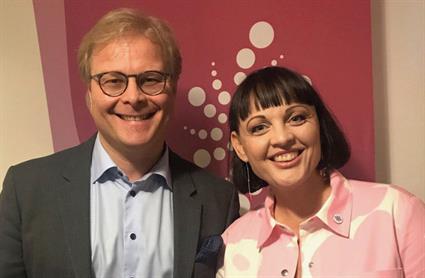

Business for good is good for business. Laila Pawlak, co-founder & CEO of SingularityU Nordic, talks to Twentyfour7. about how she is helping create ‘future proof’ leaders who can leverage exponential technologies to solve the world’s biggest problems. Read on.
Our series In Conversation poses tough questions to thinkers, decision-makers and influencers on issues that matter.
1. Technological development is accelerating. Yet, you say not enough is being done with it. Why?
One of the things we at SingularityU are really focusing on is in making sure everyone i.e. students, CEOs, politicians and entrepreneurs
understand that technological development is not only advancing rapidly but that it can also converge and influence our world in a massive way, solving some of its greatest problems including climate change, the refugee crisis, human trafficking,
homelessness or water and food scarcity.
To do this, we need to rethink the way we look at technology and the way we do business. These technologies should be part of the solution instead of part of the problem. And we all have a responsibility and a role to play in that. That is the foundation of SingularityU.
2. In this context, what does Nordic society bring to the table in terms of solutions?
What we've shown the world is ways of how we can create a society that is inclusive and allows people to get an education, allows people to
have jobs that are not killing them and allows them access to quality, affordable healthcare etc. A lot of eyes are already on the Nordics, all of them wondering how societies like ours are running, and successfully.
That’s a lot already. But there’s more that can be done. To top all this, if we become a region where we learn how to use technology for good and leverage it for positive impact in a sustainable, ethical and good way, then we will have even more eyes on us. That is a massive opportunity as well as a responsibility for the Nordics.
3. How about Nordic businesses, are they up to the challenge?
There’s an interesting mix when we look at the companies in the Nordics. We do have some front running companies that are really taking a giant leap in this
regard and they are actively working on solving real-world challenges. There are some companies that are lagging behind that need to get on board and embrace technology fast in order to not be run over or left behind. Finally, there is also a
big mass of companies that are interested in these technologies but are having a hard time figuring out how to go about the entire process. They want to know how they should start using technology to solve the world’s challenges. We all
have a responsibility to work with our clients, our partners and our vendors and have a conversation about how we might start using technology to be a force of good.
4. While big brands definitely have the financial muscle to take this forward, they are, at the same time, expected to grow and make a profit. How can they strike a balance here?
That's a very good question and I think that is
actually part of the exponential transformation we're seeing. Many organisations are beginning to see this as a core area of business development and that’s for a number of reasons. First of all, customers are starting to say to companies
that if you want my time, attention and money you need to be part of the solution and not part of the problem. Thus, we see a customer-driven transformation that enables companies to say well we need to do this because our customers require it
from us.
Another way to look at this is from an HR angle. In order to attract the best talent, you need to have a meaningful purpose in/for your organisation. Otherwise, the best people simply don't want to work for you. They need that purpose in order to thrive and to know that there is greater meaning in what they do. Finally, we're also seeing banks and other financial institutions creating new ways of investing in impact organisations, that are able to deliver a quantifiable benefit to society-at-large. This has encouraged a lot of companies to look at the bigger picture.
5. SingularityU strongly advocates the need for a network which is a partnership between businesses, business verticals, scholars and all like-minded progressive entities. Why is this necessary?
We talk a lot about what we call
‘uncommon partnerships’. I think we are now moving into an era where, for a single entity, being able to know everything about everything is impossible thanks to the vast amount of data that is being produced. We need these partnerships
and ecosystems to be able to process all this data and associated changes. Plus, because a lot of the disruptions we are seeing are not coming from our own industry but from others, being part of an ecosystem with academia, with start-ups, with
people and companies who bring in additional knowledge and capabilities, is going to be a sought-after competitive advantage going forward.
6. This is a major shift for any company considering that everyone has their own agenda. Are you saying that one should see beyond that?
Yes, definitely. I can understand why a lot of companies are struggling with being open
and transparent. That said, we need to realise that the cake is not a certain size. The cake is bigger, and if we build these partnerships successfully, we will get a bigger slice of the action, than we would have by working on our own.
7. In your opinion, what kind of a future are we currently building for future generations?
I'm more of an optimist than a pessimist, most of the time at least. We have made immense progress over the last 25 to 50 years. We've
cut the poverty rate in half and halved the mortality rate of children. I'm a strong believer that if we manage to leverage technology, train people to use this technology, use it to be part of solutions, and inspire people to become entrepreneurs
and interpreters and politicians that want to change the world for the better – if we manage to really build this abundant mindset and leverage this technology, the world is going to a really good place.
But we need to hurry, we need people to rise up and not wait for somebody else to do it. We can all play a part, and everybody needs to decide what part they want to play.
Atte Palomäki, EVP for Communications, Branding & Marketing at Wärtsilä, and Laila Pawlak, co-founder & CEO of SingularityU Nordic.
Did you like this? Subscribe to Insights updates!
Once every six weeks, you will get the top picks – the latest and the greatest pieces – from this Insights channel by email.



